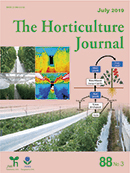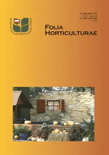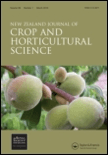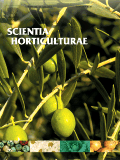
Horticultural Plant Journal
metrics 2024
Nurturing Insights in Horticulture and Ecology
Introduction
The Horticultural Plant Journal, published by KEAI PUBLISHING LTD, stands at the forefront of horticultural research and innovation. With an ISSN of 2095-9885 and an E-ISSN of 2468-0141, this open access journal has been committed to disseminating significant findings in horticulture since 2015. As of 2023, it proudly holds prestigious Q1 rankings across multiple categories, including Biochemistry, Genetics and Molecular Biology, Ecology, and Plant Science, reflecting its impactful contributions to diverse scientific fields. Located in Beijing, China, the journal not only facilitates groundbreaking studies but also provides crucial insights into sustainability and environmental issues, being ranked in the top tiers of relevant disciplines. This makes it an invaluable resource for researchers, professionals, and students who aim to stay at the cutting edge of horticultural science, offering them the latest research that informs both academic understanding and practical application.
Metrics 2024
 1.20
1.20 5.70
5.70 5.50
5.50 32
32Metrics History
Rank 2024
Scopus
IF (Web Of Science)
JCI (Web Of Science)
Quartile History
Similar Journals

BIOLOGIA PLANTARUM
Nurturing Ideas, Growing SolutionsBIOLOGIA PLANTARUM, esteemed within the realms of horticulture and plant science, is a leading academic journal published by the Academy of Sciences of the Czech Republic, Institute of Experimental Botany. Established in 1959, this journal showcases innovative research and advancements in plant biology, focusing on a spectrum of topics including plant physiology, genetics, and biotechnology. With an impressive Scopus ranking in Horticulture (Rank #41/115) and Plant Science (Rank #221/516), it holds a significant place in the academic community, reflected in its Q2 and Q3 status within its respective categories. Although it is not open access, authors are encouraged to contribute to the growing body of knowledge that supports sustainable practices in agriculture and horticulture. Published in the Netherlands, BIOLOGIA PLANTARUM continues to foster collaboration and dialogue among researchers, professionals, and students dedicated to understanding and advancing plant sciences.

Horticulture Environment and Biotechnology
Cultivating Innovations in Horticulture and BiotechnologyHorticulture Environment and Biotechnology is a prestigious journal published by the Korean Society of Horticultural Science, dedicated to advancing knowledge in the fields of horticulture, biotechnology, and plant science. Since its inception in 2011, this journal has played a crucial role in disseminating high-quality research, evidenced by its 2023 category quartile rankings, which position it in Q1 for Horticulture and Q2 for Biotechnology and Plant Science. With impressive Scopus rankings, including Rank #18 out of 115 in Horticulture, the journal continues to demonstrate its significance within the academic community by contributing to innovative practices and findings that impact both environmental sustainability and horticultural advancements. Currently, the journal is accessible to a global audience, facilitating the exchange of ideas and research outcomes with no open-access fees. Horticulture Environment and Biotechnology strives to support researchers, professionals, and students alike by providing a platform for critical discussions on the intersection of horticultural science and biotechnology, thereby fostering the development of sustainable agricultural practices that align with contemporary challenges.

Horticulture Journal
Cultivating Knowledge, Growing FuturesThe Horticulture Journal, published by the Japan Society for Horticultural Science, is a leading academic platform dedicated to the advancement of horticultural research and practices. With an ISSN of 2189-0102 and an E-ISSN of 2189-0110, this journal endeavors to publish high-quality research that emphasizes innovative techniques, sustainable practices, and the science of plant cultivation. The journal has been recognized for its impact within the field, currently holding a Q2 ranking in Horticulture and a Q3 ranking in Plant Science as of 2023, indicating its significant contribution to advancing knowledge. With its open-access model, researchers, professionals, and students have the opportunity to engage with the latest findings, thanks to the journal's commitment to widespread dissemination of information. Since its convergence period began in 2015 and continuing through to 2024, the Horticulture Journal remains instrumental in promoting sustainable and beneficial practices in horticulture science globally.

Folia Horticulturae
Fostering Growth in Agricultural and Biological Sciences.Folia Horticulturae, an esteemed journal in the field of Horticulture, serves as a pivotal platform for the dissemination of innovative research and developments within agricultural and biological sciences. Published by SCIENDO, this open-access journal has been contributing to the global scientific community since 2004, ensuring that key findings are freely accessible to researchers, professionals, and students alike. Based in Poland, the journal boasts an impressive Q2 ranking in Horticulture, indicating its solid impact and significance in the field, with a Scopus rank of #32 out of 115, placing it in the 72nd percentile. With a commitment to fostering scientific discourse, Folia Horticulturae actively encourages contributions that explore various aspects of horticultural science, from crop management to sustainability practices. This initiative not only enhances knowledge but also advances practical applications, making it an invaluable resource for anyone interested in the intricacies of horticulture.

NEW ZEALAND JOURNAL OF CROP AND HORTICULTURAL SCIENCE
Cultivating Knowledge in Crop and Horticultural ScienceThe New Zealand Journal of Crop and Horticultural Science, published by Taylor & Francis Ltd, stands as a key resource in the fields of Agronomy and Horticulture, with a commendable impact factor reflecting its quality and influence in the scientific community. Since its inception in 1989, this journal has been committed to advancing our understanding of crop development and horticultural practices, catering not only to researchers and professionals but also to students eager to delve into the intricacies of plant sciences. With a Q3 ranking in both Agronomy and Crop Science and Horticulture as of 2023, the journal occupies a significant position within the agricultural and biological sciences domain, significantly contributing to the body of knowledge in these fields. The journal features original research, reviews, and technical notes that cover a wide range of topics, ensuring a comprehensive perspective on contemporary and emerging agricultural issues. For individuals interested in accessing cutting-edge research, the journal provides subscription-based access, further enhancing its scholarly contributions.

ACTA PHYSIOLOGIAE PLANTARUM
Connecting researchers to the forefront of plant science.ACTA PHYSIOLOGIAE PLANTARUM, published by Springer Heidelberg, is a leading journal dedicated to advancing the fields of Agronomy, Plant Science, and Physiology. With an ISSN of 0137-5881 and an E-ISSN of 1861-1664, this esteemed publication has a significant global outreach, being based in Germany. The journal is recognized for its impactful contributions, currently holding a Q2 ranking in both Agronomy and Crop Science, as well as Plant Science, and a Q3 ranking in Physiology according to 2023 category quartiles. Its Scopus rankings reflect its reputable standing within the academic community, with notable placements in Agricultural and Biological Sciences, further highlighting its importance for researchers and professionals in the field. The objective of ACTA PHYSIOLOGIAE PLANTARUM is to foster robust discussions and disseminate innovative studies that enhance our understanding of plant physiology and its applications. Though not an open-access journal, it provides comprehensive access options for readers keen on exploring cutting-edge research that drives advancements in agricultural productivity and sustainability. Through its dedication to excellence, this journal continues to be a vital resource for advancing knowledge and practices in plant sciences.

SCIENTIA HORTICULTURAE
Cultivating knowledge, nurturing innovation.SCIENTIA HORTICULTURAE, published by Elsevier, is a leading journal in the field of horticulture, with an impressive impact factor reflected in its Q1 ranking (2023) and position as #6 out of 115 in the Scopus category for Agricultural and Biological Sciences. This journal plays a pivotal role in disseminating cutting-edge research and innovations in horticultural science and technology, contributing significantly to the understanding of plant cultivation, production, and management. With continuous publication since 1973, SCIENTIA HORTICULTURAE offers an essential platform for researchers, professionals, and students alike who are focused on the advancement of sustainable horticultural practices. Although it is not an open-access journal, it provides a wealth of data and findings that can be accessed through institutions and libraries. Located in the Netherlands at RADARWEG 29, 1043 NX AMSTERDAM, this journal remains an invaluable asset to the global horticultural community throughout its converged years, fostering collaboration and elevating standards in horticulture research.

Frontiers in Plant Science
Advancing the frontiers of plant biology.Frontiers in Plant Science is a premier open-access journal dedicated to advancing the understanding of plant biology, covering a broad spectrum of topics including physiology, ecology, and biotechnology. Published by FRONTIERS MEDIA SA in Switzerland, this journal has established itself as a key resource in the field of plant science, boasting an impressive impact factor and ranking in the Q1 category for plant science as of 2023. With its Scopus rank of 61 out of 516 in both Agricultural and Biological Sciences, the journal is recognized for its quality and relevance, being in the 88th percentile among its peers. Since its inception in 2010, Frontiers in Plant Science has embraced an open-access format, ensuring that cutting-edge research is readily available to scientists, professionals, and educators around the globe. The journal aims to foster innovative research and collaboration within the plant science community, making it an essential publication for those looking to stay at the forefront of the discipline.

Horticulturae
Cultivating Knowledge, Growing Innovation.Horticulturae, an esteemed open-access journal published by MDPI, is at the forefront of horticultural science, showcasing innovative research and advancements in the field since its inception in 2015. With its base in Switzerland, this journal operates under the ethos of global accessibility, allowing researchers, professionals, and students to share and disseminate critical findings without barriers. Horticulturae holds a distinguished Q1 ranking in Horticulture and Q2 in Plant Science, as reported in the 2023 categorizations, highlighting its impactful contributions to the scientific community. The journal features rigorous peer-reviewed articles covering a wide range of topics, including plant physiology, crop production, and sustainable practices, making it a vital resource for anyone engaged in gardening, agronomy, and environmental science. As it converges its focus from 2015 to 2024, Horticulturae not only aims to further academic discourse but also aligns with the growing need for research pertaining to biodiversity and sustainable agriculture, thus ensuring relevance in an ever-evolving field.

HORTICULTURAL SCIENCE
Nurturing Ideas, Harvesting Solutions.HORTICULTURAL SCIENCE is a premier scholarly journal published by the Czech Academy Agricultural Sciences, focusing on the myriad facets of horticulture, including plant breeding, cultivation techniques, and sustainable practices. With a robust Open Access model established since 2002, it aims to disseminate high-quality research to a global audience, fostering collaboration and innovation within the field. Located in the heart of Prague, Czech Republic, the journal boasts an impressive Q2 ranking in Horticulture as reported in 2023, placing it within the top tier of its discipline. Furthermore, it ranks 52nd out of 115 in the scope of Agricultural and Biological Sciences, reflecting its growing influence and reach in horticultural research. The journal is an essential resource for researchers, professionals, and students alike, aiming to advance knowledge and practices in horticulture through original research articles, reviews, and case studies. With its commitment to academic rigor and relevance, HORTICULTURAL SCIENCE stands as a vital contribution to the ongoing discourse in horticultural studies.